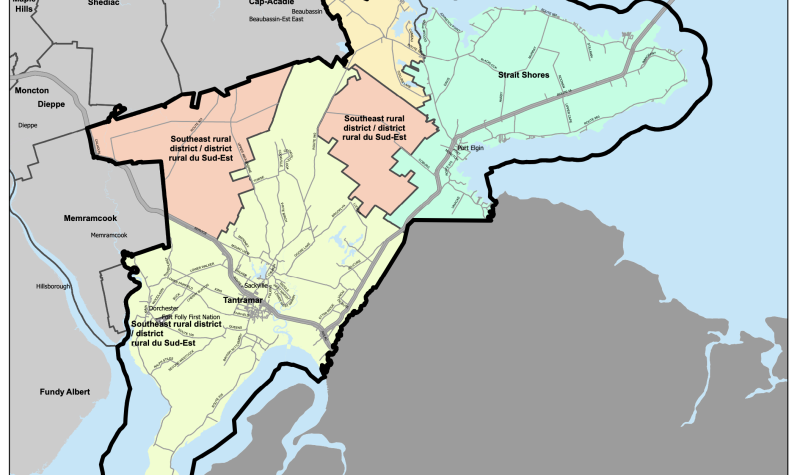Residents of Tantramar will likely be voting as part of a new riding in the next provincial election.
The commission to adjust New Brunswick’s electoral boundaries has submitted its final report and it recommends the riding of Memramcook-Tantramar be split up. The Memramcook portion will move over to a Memramcook-Dieppe riding, and the remaining portion will become Tantramar, including the municipalities of Tantramar, Strait Shores, parts of the southeast rural district, and a small area of Cap-Acadie.
The redistribution means that Tantramar (the riding) will have the fewest electors out of all the ridings in the province. The average electoral population for all 49 ridings in the province is 11,667, but the new riding of Tantramar clocks in at 9058, 22.36 per cent below average. It’s one of only four ridings in the province to have less than 10,000 eligible electors, and it borders on two ridings with over 12,000 electors, and one with over 13,000.
Dr. Mario Leveseque is head of political science at Mount Allison University. He says he’s disappointed in the commission recommendation.
“They missed a real opportunity here to better integrate the region,” says Levesque, who favours not splitting up Memramcook-Tantramar, but rather adding some more Francophone voters to the riding, in order to balance out linguistic representation.
One of the reasons the commission considered changes to Memramcook-Tantramar is complaints from Memramcook and the Societé des Acadiens de Nouveau Brunswick about the minority language and cultural representation in the riding. The Memramcook-Tantramar riding is about 30 per cent Francophone, and Memramcook mayor Maxime Bourgeois told CHMA last year that his community shared more in common with neighbouring Dieppe. Although the current MLA Megan Mitton is fluently bilingual, Bourgeois said there was no guarantee that would always be the case for the region’s elected representative, with only a minority of French speakers voting.
The solution to this issue proposed by the commission frees Memramcook residents from minority language status, only to put other Francophone communities in an even worse position. A group of communities that are on the eastern edge of Cap-Acadie have been put in the Tantramar riding, because not doing so would mean the riding would be too small to pass muster with New Brunswick’s electoral boundaries legislation. Tantramar without the 760 electors from Cap-Acadie would be under 8300 electors, 29 per cent below the average riding electorate population, which is above the threshold of 25 per cent outlined in the legislation.
But while about 30 per cent of Memramcook-Tantramar is Francophone, only 15% of the new Tantramar riding will be Francophone, meaning the linguistic minority will be even more of a minority.
With Levesque’s proposed solution, portions of Cap-Acadie might still join the riding, but the population would help balance out French and English speaking communities, instead of creating a more pronounced linguistic minority for a different set of people.
“You can’t tell me that we can’t do this,” says Levesque, “because look at Dominic LeBlanc’s riding, federally. That goes all the way up to Bouctouche, it includes Francophone, it includes Anglophone, the whole works. If we can do it even bigger scale, federally, we can do it provincially. What we lack is the courage to go there, though.”
Levesque thinks that eventually, the population growth patterns of the southeast will mean a reckoning is in order, and he expects the next electoral commission to deal with the same issue again.
He says population growth in Shediac, Dieppe and Cap-Pele are outstripping the growth in Sackville and Port Elgin, meaning the new riding of Tantramar, already the smallest in the province, will stray even farther from the electoral average.
“We’re going to be revisiting this again in 10 years time,” says Levesque. “Then you’re going to have Tantramar with 40%, deviation, and the rest of the region even higher. That doesn’t make sense, but that’s where it’s heading.”
Seemingly in anticipation of future population growth, the commissioners this year have recommended that the province change its legislation to be more lenient with a 25 per cent deviation threshold under certain circumstances. The suggestion is made in consideration of the 760 electors of Cap-Acadie that may be relocated to 80% anglophone Tantramar, just to keep the riding under the threshold. The commissioners blame “the unique nature of the shape and location of the French and English communities in this portion of New Brunswick,” as the cause of such a high deviation.
A change in the law could lock in a tiny riding of Tantramar for more time before adjustments need to be made which is a silver lining of sorts for residents of Tantramar.
“You turn it on its head… Their vote counts more than someone in the other ridings around us. Because we have fewer people to convince to vote for a party, their vote counts for more,” says Levesque. “Whereas in the other ridings, you’ve got to convince more people to vote for you because of a population difference.”
“So for people Tantramar, sure, it’s happy,” says Levesque. “But I think it’s very, very, very short sighted of this commission.”
Listen to the CHMA story below:


